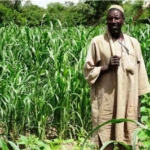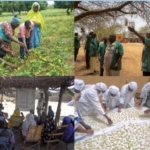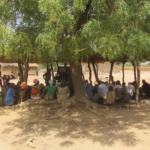


Groundswell International
Groundswell West Africa, ANSD (Association Nourrir sans Détruire), The Institute for the Environment and Agricultural Research (INERA/regional direction/Fada), Association Minim Song Paanga (AMSP)
Burkina Faso
12/2019—12/2023
In Burkina Faso, there is an urgent need to address the dual crisis of land degradation and climate change. To address this challenge, the NGO Groundswell International together with the NGO Association Nourrir Sans Détruire (ANSD; the name means “to nourish without destroying”), the farmer organization Association Minim Sông Pânga (AMSP), and the National Institute of Environmental and Agricultural Research (INERA) of Burkina Faso, formed a consortium in 2012 and started investing their joint efforts on agroecological intensification (AEI). The first phase of their CCRP-funded project enabled about 6,800 farmers across four counties to test and adapt various combinations of AEI techniques. Results included restoration of highly degraded land, yield increases for sorghum, pearl millet, and cowpea, reduced Striga infestation, improved diets, and stronger household adaptive capacity. A second phase aimed to more systematically delineate and assess options for a stronger AEI systems approach for various types of households, by gender, and by context; to consolidate and build the evidence base for developing and improving promotion and scaling of AEI; and to help farmers continue learning how to transition to AEI. This second phase is not yet completed; however, a preliminary assessment revealed that farmers and their organizations have continued implementing AEI options, and innovation is increasing.
Funding is recommended because this project represents research on scaling AEI of smallholder farming systems in Burkina Faso, thereby building on an emerging FRN approach. This FRN-for-AEI scaling effort is unique and exemplary in the West Africa community of practice. In this third phase, the project team will move forward towards a more systems-oriented and contextualized research approach, including crop-tree-livestock integration in different contexts and a stronger focus on bio-fertilizer research (including ecological sanitation and circular economy). New linkages to agricultural value chains are also envisaged. The suggested participatory monitoring and evaluation is a good learning opportunity. Some team members have been very active in the CCRP FRN working group, and the project will build on recent learnings regarding their emerging FRN. The proposal illustrates awareness about important CCRP themes and core values such as option-by context interaction, co-creation, gender and diversity, and equity and inclusion of those most vulnerable and poor. It also explicitly mentions linkage to the agroecology movement in Burkina Faso.
Outcomes: As these knowledge-related outputs are generated within the 80 villages and across four counties, they will contribute to:


